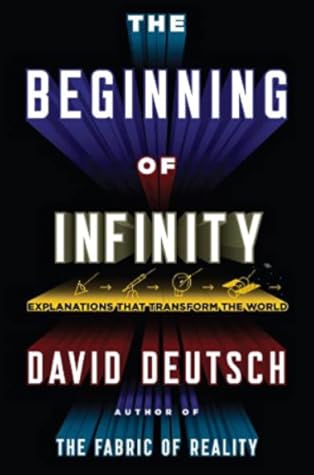More on this book
Community
Kindle Notes & Highlights
Read between
April 28 - July 16, 2019
As the ancient philosopher Heraclitus remarked, ‘No man ever steps in the same river twice, for it is not the same river and he is not the same man.’
The quest for good explanations is, I believe, the basic regulating principle not only of science, but of the Enlightenment generally.
This also illustrates the emptiness of reductionism in philosophy.
Beauty, right and wrong, primality, infinite sets – they all exist objectively. But not physically.
The diversity of attributes in both cases is a physical fact, independent of what anyone knows or feels.
Even different electrons do not have completely separate identities.
Thus a culture is in practice defined not by a set of strictly identical memes, but by a set of variants that cause slightly different characteristic behaviours.
It can mean providing someone with what they need. But it can also mean preventing things from changing
But the broader interpretation, that survival depends on good resource management, has almost no content: any physical object can be deemed a ‘resource’. And, since problems are soluble, all disasters are caused by ‘poor resource management’.
Thus we now understand why alchemists never succeeded at transmutation: because they would have had to understand some nuclear physics first.
Static societies eventually fail because their characteristic inability to create knowledge rapidly must eventually turn some problem into a catastrophe.
Strategies to prevent foreseeable disasters are bound to fail eventually, and cannot even address the unforeseeable.
To prepare for those, we need rapid progress in science and technology and as much wealth as possible. 18
‘This is Earth. Not the eternal and only home of mankind, but only a starting point of an infinite adventure. All you need do is make the decision [to end your static society]. It is yours to make.’
Even Feynman cannot get round the fact that the future is not yet imaginable.
I believe that it would be worth trying to learn something about the world even if in trying to do so we should merely learn that we do not know much…It might be well for all of us to remember that, while differing widely in the various little bits we know, in our infinite ignorance we are all equal. Conjectures and Refutations (1963)
He believed that what distinguishes science from unscientific fields such as literary criticism, philosophy or art is that science has the ability to ‘resolve questions’ objectively (by comparing theories with reality), while other fields can produce only multiple, mutually incompatible interpretations of any issue. He was mistaken in both respects.
Our best theories are telling us of profound mismatches between themselves and the reality that they are supposed to explain.
The problem of the nature and effects of dark energy is no minor detail, nor does anything about it suggest a perpetually unfathomable mystery. So much for cosmology being a fundamentally completed science.
When the total volume that we can see is a million times larger than it is now, we shall see things that have a probability of one in a million of existing in space as we see it today. Everything physically possible will eventually be revealed: watches that came into existence spontaneously; asteroids that happen to be good likenesses of William Paley; everything. According to the prevailing theory, all those things exist today, but many times too far away for light to have reached us from them – yet.


